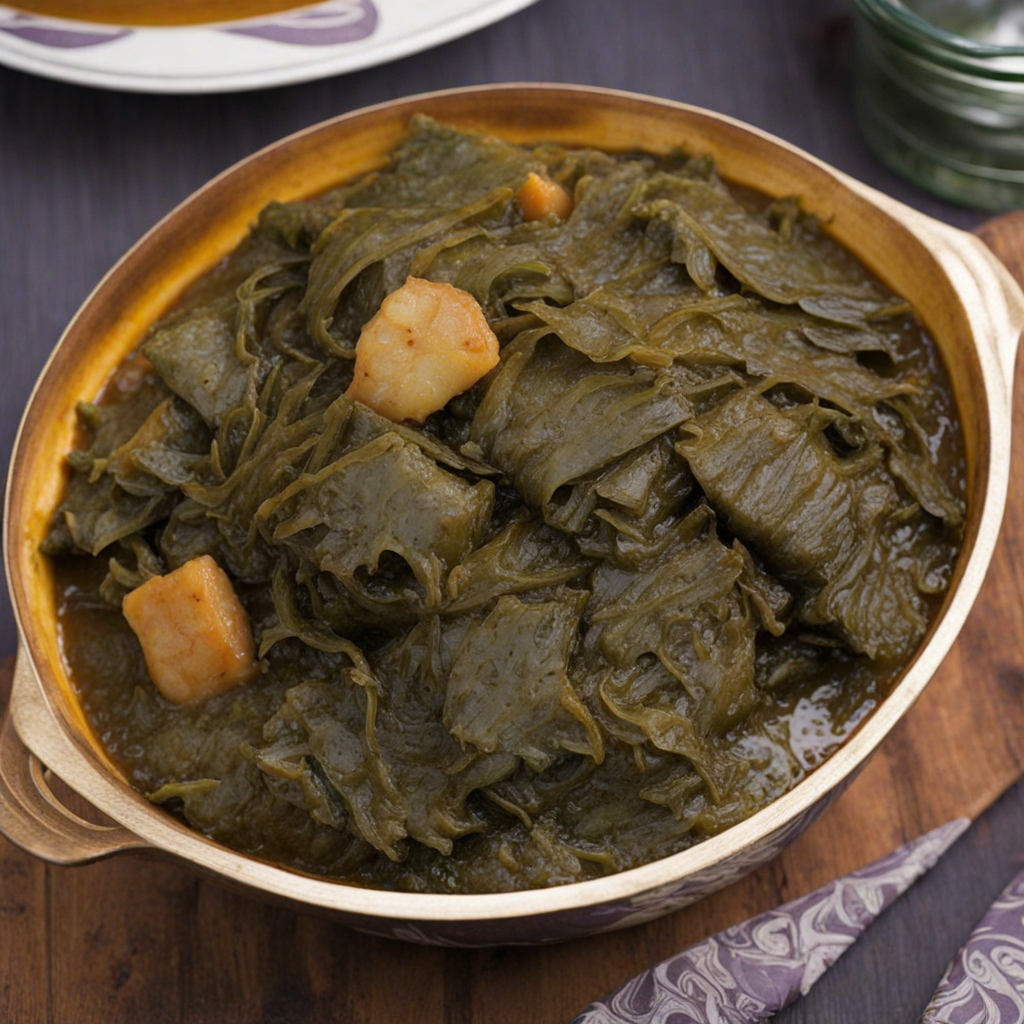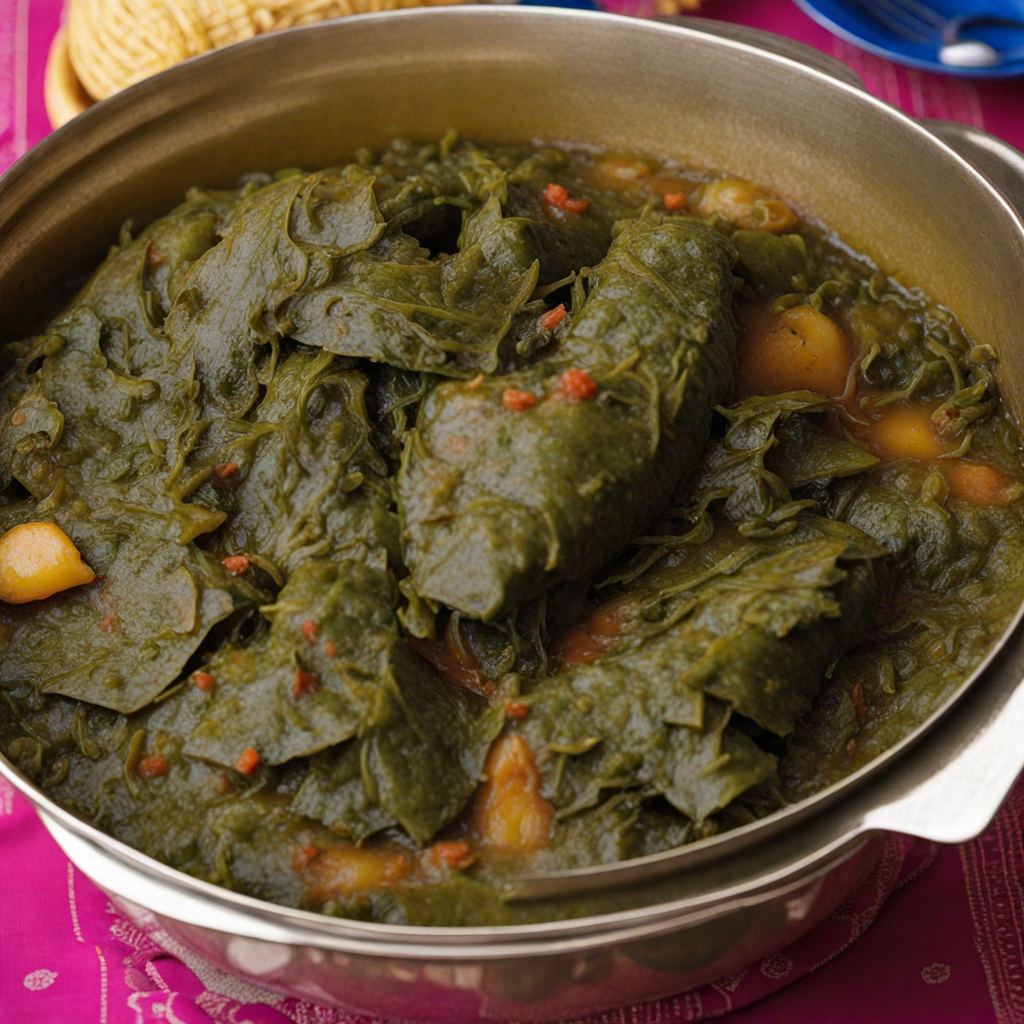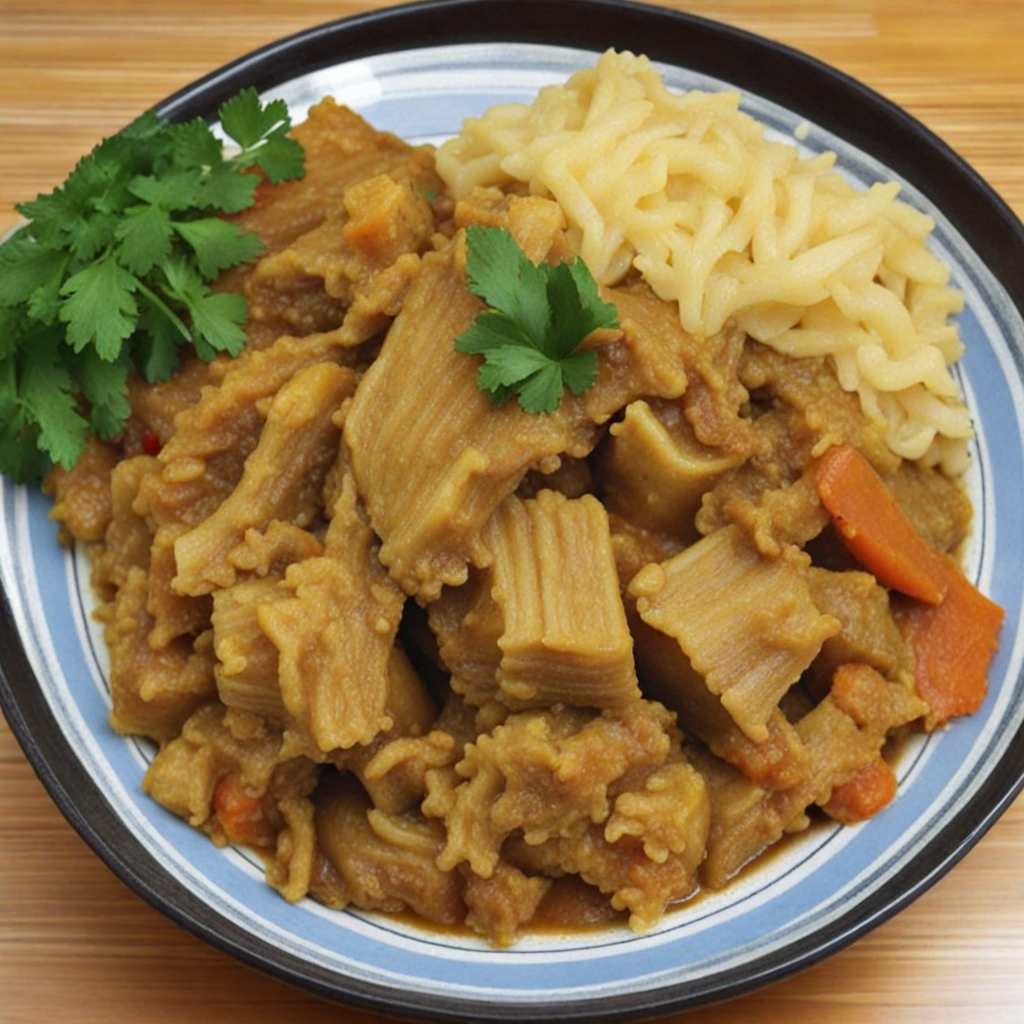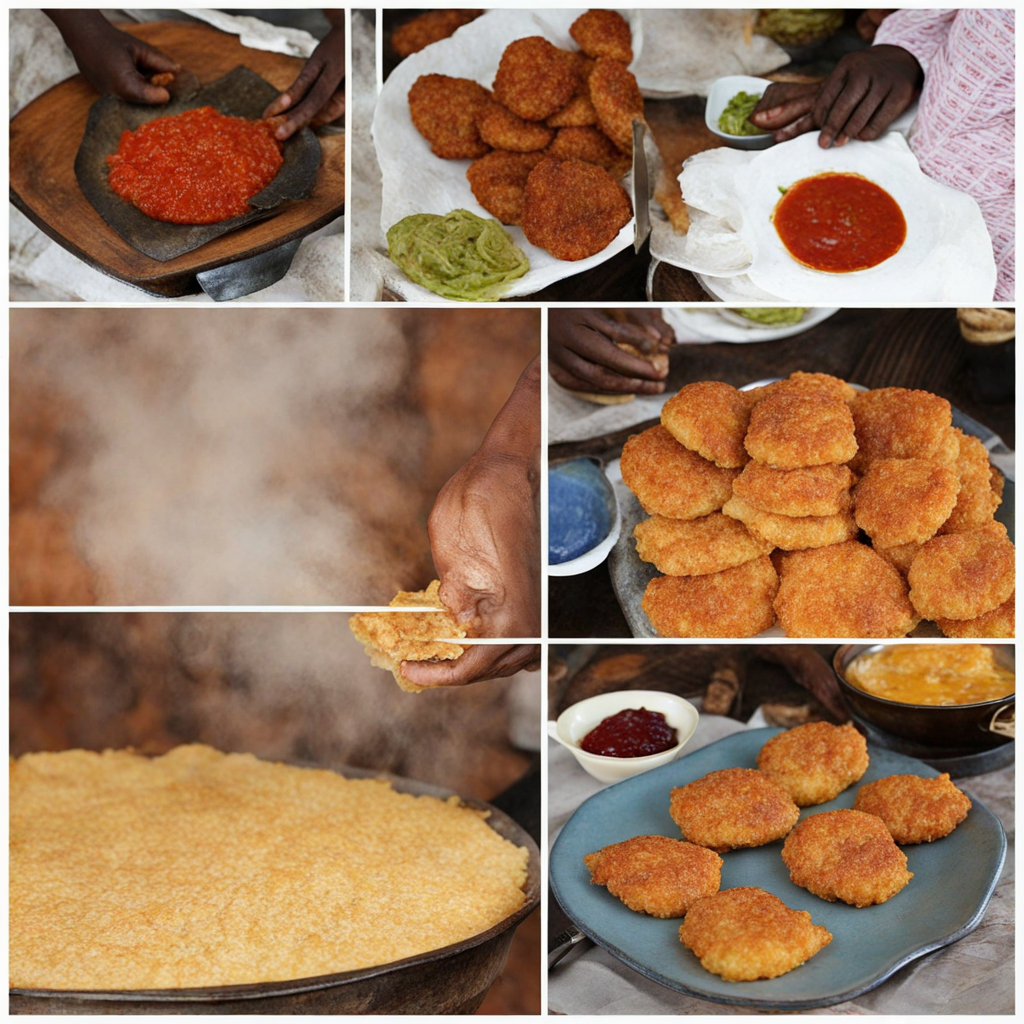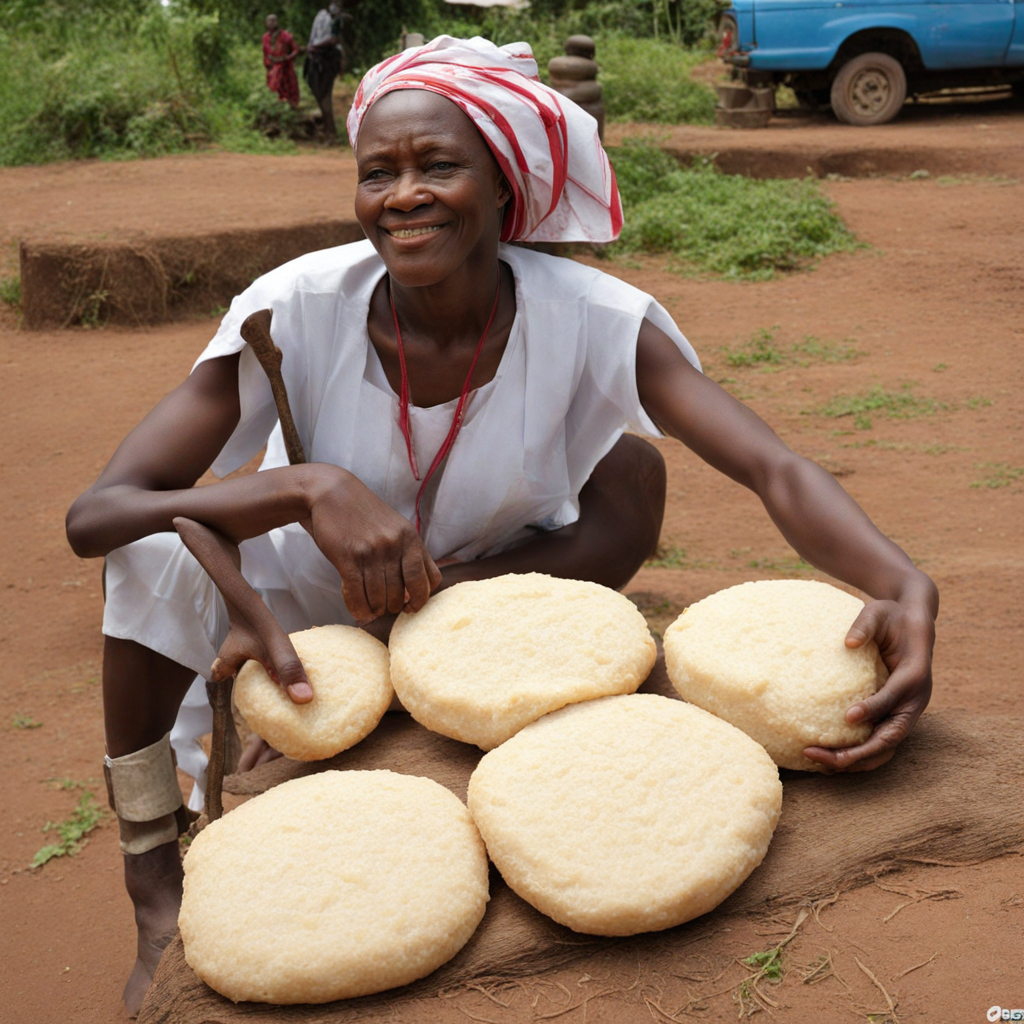Pondu
Pondu, a traditional dish from the Congo, is a delightful representation of the region's rich culinary heritage. At its core, Pondu is made from cassava leaves that are meticulously washed, pounded, and cooked down to create a thick, flavorful stew. The leaves are often combined with ingredients such as ground peanuts, palm oil, and a variety of spices, which contribute to its savory and slightly nutty flavor profile. The vibrant green color of the dish is not only visually appealing but also signifies the freshness of the ingredients used, making it a staple in many Congolese households. What sets Pondu apart is its versatility; it can be enjoyed as a main dish or a side, often served alongside starchy staples like fufu, rice, or plantains. The combination of the rich, earthy flavors from the cassava leaves with the creamy texture of ground peanuts creates a comforting and satisfying meal. The use of palm oil adds a unique depth of flavor, enhancing the overall experience. Each bite is a celebration of the natural ingredients that are abundant in the region, making it a dish that is both nourishing and fulfilling. For those looking to explore new tastes, Pondu offers an authentic glimpse into Congolese cooking. Its preparation can vary from household to household, with families often adding their own twist using local spices or meats, which can include fish or chicken. This adaptability allows Pondu to cater to a wide range of palates, while still preserving its traditional roots. Whether you're enjoying it at a local restaurant or trying your hand at making it at home, Pondu is sure to leave a lasting impression and introduce you to the vibrant flavors of the Congo.
How It Became This Dish
The Rich History of Pondu: A Culinary Gem from the Congo Pondu, also known as "saka saka," is a traditional dish deeply rooted in the culinary landscape of the Democratic Republic of the Congo (DRC) and surrounding regions. This flavorful dish, primarily made from cassava leaves, embodies the richness of Congolese culture and serves as a testament to the resilience and adaptability of its people. To understand Pondu fully, one must explore its origins, cultural significance, and how it has evolved over time. #### Origins of Pondu The origins of Pondu can be traced back to the indigenous communities of Central Africa, where cassava (Manihot esculenta) has been cultivated for centuries. Cassava, a tuber native to South America, was introduced to Africa in the 16th century, quickly becoming a staple due to its resilience in diverse climates and its ability to grow in poor soils. In the Congo region, cassava transformed the agricultural landscape, leading to the development of numerous dishes, with Pondu being one of the most beloved. The preparation of Pondu involves harvesting young cassava leaves, which are then processed to remove their natural toxicity. This detoxification process typically includes boiling the leaves and changing the water several times. Once prepared, the leaves are finely chopped and sautéed with ingredients such as palm oil, ground peanuts, or fish, resulting in a rich, hearty dish that is both nutritious and flavorful. #### Cultural Significance Pondu holds a special place in the hearts of the Congolese people. It is not just a dish; it is a cultural symbol that reflects community, heritage, and identity. Traditionally, Pondu is served during significant gatherings, such as weddings, funerals, and communal feasts, acting as a unifying force among families and friends. In many Congolese households, preparing Pondu is a communal activity. Family members often gather to harvest cassava leaves, prepare the ingredients, and cook the dish together. This practice fosters a sense of belonging and reinforces intergenerational bonds, as stories and traditions are passed down through the act of cooking. As a result, Pondu is more than sustenance; it is a medium for cultural expression and a celebration of shared history. The dish also reflects the ingenuity of the Congolese people in utilizing locally available resources. The use of cassava leaves in Pondu highlights the importance of sustainability in traditional cooking practices, as the plant is a highly productive crop that provides food security. Additionally, the incorporation of ingredients like palm oil and peanuts showcases the rich biodiversity of the region and the culinary creativity of its inhabitants. #### The Evolution of Pondu Over Time As with many traditional dishes, Pondu has evolved over the years, influenced by various factors including globalization, migration, and modernization. In urban areas of the DRC and among Congolese diaspora communities abroad, Pondu has adapted to incorporate new ingredients and cooking methods while still retaining its essential character. One notable change is the growing popularity of Pondu beyond the boundaries of the DRC. As Congolese communities have spread across the globe, so too has their cuisine. Pondu has been embraced by food enthusiasts and cultural explorers, often featured at international food festivals and African restaurants. This globalization has led to a fusion of flavors, with chefs experimenting by adding spices, meats, or vegetables not traditionally associated with the dish. Furthermore, the rise of social media has played a significant role in promoting Pondu and other traditional dishes. Platforms like Instagram and TikTok allow food lovers to share their culinary creations, bringing attention to the cultural significance of Pondu and encouraging younger generations to take pride in their heritage. Cooking classes and food blogs dedicated to Congolese cuisine are also becoming more prevalent, offering recipes and tips for preparing Pondu at home. Despite these changes, the essence of Pondu remains intact. The dish continues to be a source of comfort and nostalgia for many Congolese people, serving as a reminder of home and family. In this way, Pondu has become a bridge between past and present, preserving traditional practices while embracing contemporary influences. #### Conclusion Pondu is more than just a dish; it is a reflection of the rich cultural tapestry of the Democratic Republic of the Congo. Its origins in the cultivation of cassava speak to the resourcefulness of the Congolese people, while its cultural significance highlights the importance of community and shared heritage. As Pondu continues to evolve in response to changing times, it remains a cherished symbol of identity, resilience, and the enduring power of food to bring people together. In a world increasingly influenced by globalization, Pondu stands as a testament to the importance of preserving culinary traditions while also celebrating innovation. Whether shared at a communal feast or enjoyed in the comfort of one's home, Pondu connects generations and continues to nourish both body and soul, ensuring its place in the hearts of many for years to come. Through every bite of this beloved dish, the rich history and vibrant culture of the Congo live on, inviting all to partake in its legacy.
You may like
Discover local flavors from Congo


